Chhy Chhy Yeak and Arwa Iqbal
Developing a Systems Medicine High School Curriculum
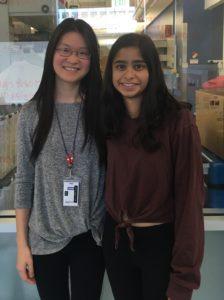
By: Chhy Chhy Yeak & Arwa Iqbal
Throughout our internship, we assisted our mentor, Becky Howsmon, and two visiting teachers, Dawn Tessandore and Emily Borden, in leading the 3-week “STEAM Towards a Healthier World” course. This course was designed to educate 18 high school students using the Systems Medicine curriculum framework that ISB’s Systems Education Experiences team has been developing with OSPI. One of the main goals of the STEAM course was to encourage high school students to become Ambassadors in their community by translating their learning into art projects. Their projects connected the concepts of Systems Medicine and the environment, and included a call to action for the community on how to improve health.
As high school students, our perspectives were valuable for this program’s success. We were responsible for helping to plan and develop engaging activities that would teach the Ambassadors the content of Systems Medicine. Afterwards, we debriefed and reflected on the outcome of the program using feedback from the Ambassadors. At the end of our internship, we helped to further develop the curriculum by researching existing educational resources for two topics that the Ambassadors were deeply interested in — population genetics and the microbiome. Below is a more in-depth timeline of what we did during our internship.
Week 1 + 2
In our first week, we were introduced to the concept of Systems Medicine. We did this through reading the P100 Wellness Study Paper and two other unpublished papers. We learned how P4 Medicine is a proactive approach to one’s health. Rather than using the reductionist approach when a person gets sick, seeks help, and is sometimes cured, P4 Medicine focuses on collecting multi-omic data and providing behavioral coaching to prevent disease before they can occur.
Later in the week, we visited P4MI, a start-up company designed to use the preventative medicine approach with all their patients. Here, we were truly able to understand P4 Medicine in action. We ended the first week by attending a talk at Fred Hutch, presented by Marc Stewart, the medical director of Seattle Cancer Care Alliance.
During the rest of the time, we had daily meetings within our team of five people (Chhy Chhy, Arwa, Becky, Ms. Tess, and Ms. Borden). We discussed, planned, and began working on our assigned projects to prepare for the STEAM course. When we had extra time, we attended a few open lectures in the ISB Summer Course, where guest speakers talked about current research in the field of Systems Biology.
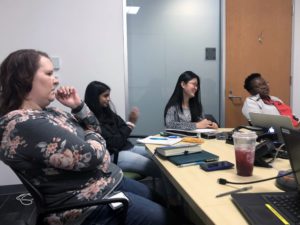
Daily meeting with our team (and Nyasha Chambwe in this specific meeting).
Week 3
This was the first week of the STEAM course. We were able to participate with the Ambassadors as they listened to guest speakers and attended the Seattle Science Foundation’s Anatomy Bootcamp. There, we had the amazing opportunity to listen to lectures from surgeons on the different parts of the body. After each lecture, we went into a lab to see and interact with human cadavers that were frozen without formaldehyde. We were able to touch body parts such as the heart, spine, limbs, brain, and many more organs in the gut. Sometimes, we were even offered the chance to assist in surgical demonstrations.
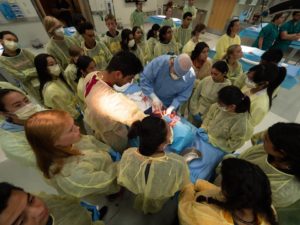
Showcasing the upper body and the dissection of a heart!
For the last 2 days of this week, we planned and implemented several activities to teach the Ambassadors about mutations in cancer. These activities included an Intro to Cancer presentation and an interactive cancer gene activity. In addition, Arwa got to work with Ms. Borden to run a lab experiment with the Ambassadors to explore the impact of the environment on nematode worms. Chhy Chhy helped Ms. Tess lead the Bioethics and Intro to Scientific Papers discussions. We also led icebreakers such as Telephone and a poster activity we called ‘Board Talks’.
Week 4
We spent this week teaching the Ambassadors about how different environments can correlate to higher risks of diseases. Through guest speakers, we learned about the microbiome, proteomics, importance of self-advocacy in medicine, and computational biology. With the help of Dr. Nyasha Chambwe, we planned and led a Card Clustering activity using Amino Rummy card decks. This was one of the most successful activities in the program, where the Ambassadors were able to simulate how scientists organize patient data and analyze it using computational biology. We ended the week at Cambia Grove, where the Ambassadors began brainstorming and working on their final showcase projects.
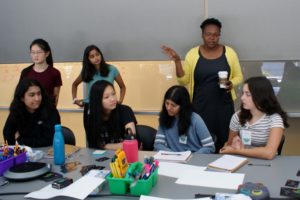
Leading the Card Clustering activity with great success!
Week 5
This was the last week of the STEAM course. Our main role was to act as a support system for the Ambassadors as they developed and finalized their showcase projects. We also worked on making their Certificate of Completion and a flyer to advertise the showcase event. After an amazing showcase event where many ISB employees and external people attended, we visited the Gates Foundation Discovery Center and led a good-bye memory box activity to ensure everyone could exchange parting notes and establish strong connections as they keep in touch in the future.
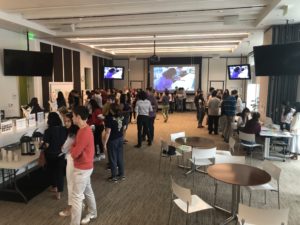
Final art showcase project for the STEAM pilot program.
Week 6 + 7
Our main focus for these two weeks were to debrief on what was successful in the STEAM course and what needed improvement. We also started researching existing educational resources for curriculum topics that we found the Ambassadors enjoyed and should be further developed for the Systems Medicine curriculum — population genetics and the microbiome. These weeks were also focused on building our website and finishing up our interviews with scientists and healthcare professionals. For our final intern project, we decided to hand-make our poster to represent the ‘A’ in STEAM — art.
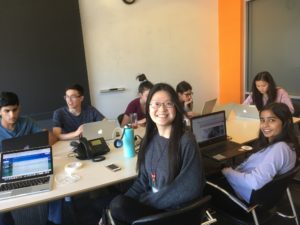
Website meeting with the high school interns!
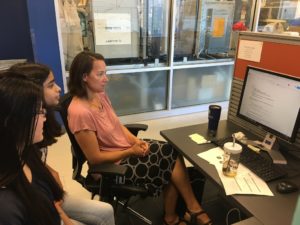
Meeting with our mentor, Becky.
Acknowledgement
Special thanks to Dee Dickinson and the Dean Witter Foundation for making the STEAM course possible.
Thank you to…
Claudia Ludwig, Dawn Tessandore, Emily Borden, Rachel Calder, P4 Medicine Institute, Seattle Science Foundation, Cambia Grove, Fred Hutch, the other high school and undergraduate interns, the STEAM Ambassadors, and ISB.
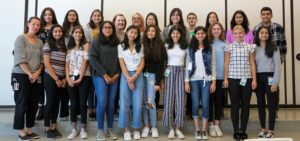
Group picture with STEAM Ambassadors!
And finally, many thanks to our mentor, Becky Howsmon, for guiding us in our wonderful internship journey. We wouldn’t have had this experience without you.